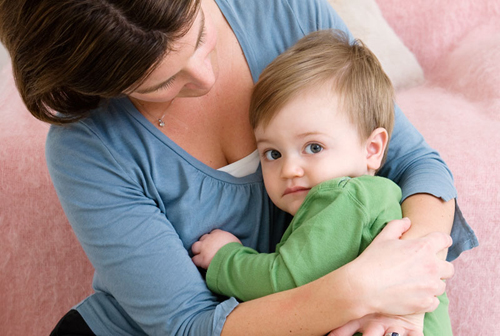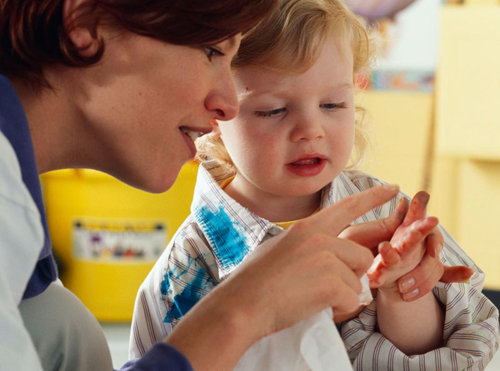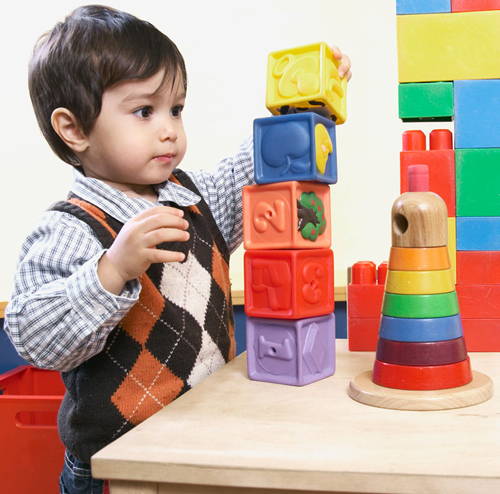| Q: |
Should I stay at home with my son or take him to day care?
| | A: |
Many parents feel guilty and worried about taking their child to
day care or leaving them with a nanny. However, good-quality childcare,
balanced with loving and nurturing time at home, can bring huge
benefits. At this age your child is increasingly interested in other
children and will be starting to play more cooperatively with them
(rather than in parallel alongside them). Children learn through play,
so being with other children helps them develop. Research suggests that
children who go to day care may be better at sharing, working together,
and understanding others’ feelings. This time will also help to develop
your child’s confidence and independence in preparation for school.
Childcare (whether day care
or a nanny) provides a much-needed break for parents, so you will have
plenty of time and energy for your child when he returns. Many parents
now choose to take their child to day care or hire a nanny for part of
the week even if they are not returning to work. However, if you do
choose to stay at home with your child, make sure that you give him
plenty of opportunities to be around other children of his age.
|
| Q: |
My daughter cries and says she won’t go to day care without her favorite bear. Should I let her take it?
| | A: |
Leaving the comfort, safety, and security of home to spend time
at a new place with unfamiliar people makes some children anxious at
first. Holding onto an object from home will help your daughter feel
safe and allow her to cope better with this change. If she insists on
bringing her teddy bear long after she has settled in, or if it prevents
her from joining in with activities, you may want to help her leave it
at home. Don’t ask her to give it up immediately, which may make her
even more anxious. Speak to the day-care providers and see if they can
find somewhere for your daughter to put teddy away when she is settled.
As she becomes more confident, encourage her to hand her teddy bear to a
staff member as you arrive, then the next week to leave it with you at
the door, and eventually to say good-bye to him at home. To avoid any
upset, you may want to purchase an identical teddy for home—just in case
hers gets lost.
|
| Q: |
It is so hard to say good-bye to my son. What might help?
| | A: |
Having spent so much time together at home, it’s bound to be
difficult when you have to wave to your child and leave them in someone
else’s care—particularly if your child is upset, too. With emotions
running high for both of you, it can be difficult to say good-bye
properly. However, a consistent routine will help both of you cope
better with the separation and allow your son to get on with the
important task of having fun. So don’t sneak off without saying good-bye
leaving him to worry where you’ve gone, and don’t drop your son at the
door and then leave quickly. Take a few minutes to settle him in when
you arrive, then give him a hug and kiss, and say clearly, “I’m going
now”—but let your son know when you will be back to get him. When you
have left, avoid the temptation to watch him through the window. However
difficult saying good-bye may be at first, saying hello at the end of
the day will more than make up for any upset in the morning.
|
| Q: |
My child is very unsettled at day care and says he does not want to go. Should I make him?
| | A: |
Starting at day care is often the first major transition that a
child needs to deal with. We are all different in terms of how well we
cope with these life events, and how long it takes us to adjust and move
on. Your son could just be getting used to things at his own pace. If
he is as upset now as the day he started, there may be issues at day
care that are making him unhappy. Ask your son what he likes and
dislikes about school, and speak to his main caregiver to get her view
on how things are going. Find out how he spends his time there—what
activities does he like best? Does he play with the other children?
Having one or two children that he gets along well with can really help,
so see if there are any opportunities to meet up with other families on
the weekends. At home, remind your son about the fun things he does
there. Keep the lines of communication open with staff, and ask for a
regular update on his progress—out of your son’s earshot. If things
don’t improve, it might be that the day care is not meeting his needs,
and you may want to consider an alternative setting.
|
| Q: |
I want to potty train my son. How will I know if he is ready?
| | A: |
Starting potty training too early will result in frustration and
upset for you and your child, so ask yourself these questions to see if
he is ready to begin. Does your child have control of his bowels at
night? Does he have the balance and coordination needed to squat down on
a potty and get up again, or to climb up and hold himself on a toilet
seat? Can he pull his pants up and down without help? Does he tell you
in words or gestures when he wants to urinate or defecate? If the answer
to these questions is yes, then your son is probably ready to take the
next step. Start off by letting him pick out a potty or child toilet
seat that he likes. Adult toilet seats are too large and can intimidate
children. Children’s seats are the right size for a toddler, and some
also have handles for extra security. If you are using a potty, leave it
out in the same place. Get into a routine of sitting your son on the
potty or toilet for a few minutes when you are changing his diaper.
Providing a small step will allow your child to get on to the toilet
independently. Give him lots of praise and encouragement—good sitting
and results will follow! Make sure your son has plenty to drink and
allow him some time without a diaper on. This will give him lots of
practice and make it easier for him to go when he needs to. Most
importantly, stay calm when things get messy. If your child feels
pressured to get it right first time, he will hold back from performing,
so support your child’s efforts when things don’t quite go according to
plan. Allow him to learn at his own pace, and it should all fall into
place eventually.
|
| Q: |
I don’t want my daughter to go to day care because I’m scared I’ll miss her growing up. Is this silly?
| | A: |
Whether your daughter goes to day care or not, the truth is that
children develop so fast at this age that, try as you might, you are
bound to miss at least one new achievement. Day-care staff will be
prepared for this, and usually provide you with a record of your child’s
progress. They may even be able to record events on video, or you could
buy a disposable camera and leave it with them—just in case your
daughter decides to do something momentous in your absence! It is rather
frustrating to find out that you put in all the hard work only for
someone else to reap the benefit of seeing your child do something for
the first time. However, your daughter will take great delight in
showing off her new skills, and in years to come you will witness many
more of her achievements than you miss.
|
| Q: |
My child has a very settled routine. Will going to day care or a nanny upset it?
| | A: |
It is quite likely that, whichever childcare arrangement you
choose, some of the caregiver’s daily routines for feeding, sleeping,
playing, and resting will be different from your own. This does not mean
that all of your hard work was in vain, since your child will still
benefit from the security of clear boundaries and a consistent approach.
Speak to the day-care center in advance to let them know about any
important routines you have at home, and to find out how their practice
differs from what your child is used to. You may want to think about
changing some of your routines to fit more with the routine at day care
to help your child settle in more quickly. If you choose a family day
care, you may be able to request that they follow your own routine if
there are only a few children there. Don’t forget that your child will
be one of a group, all doing the same thing, and their growing interest
in copying others’ behavior can make it much easier to establish new
routines.
|
| Q: |
My son gets upset if I leave him for even a minute. How will he cope when he starts school?
| | A: |
Your son may be sensitive to change in his social environment and
need longer to adjust to new routines. If he is anxious about meeting
new people or being in unfamiliar places, his instinctive reaction will
be to stay as close to you as possible because he knows that you will
protect him. To help prepare him for school, let him spend time with
friends and family to gain some positive separation experiences. Games
of peek-a-boo can help him learn to tolerate disappearances and expect
reunions. As he comes to realize that being apart from you always ends
with your return, his anxiety and clingy behavior will reduce. Give him
plenty of notice before taking him out—tell him where he is going, who
he will see, and what he will do there. Take along some favorite toys to
occupy him and to provide familiar activity. Once he is playing
happily, withdraw quietly, but don’t go too far at first. Check back in
with him regularly so he can see you are still around if he needs you.
Over time, as he grows
in confidence, you will be able to withdraw more quickly and venture
further afield, eventually leaving him in the care of someone you and
your child both trust.
|
Separation anxiety
Separation anxiety
is the distress shown by children when you leave them in the care of
someone else. It begins at around six to nine months—the age when your
child first becomes aware of strangers. Showing signs of separation
anxiety is your child’s way of trying to keep you close to make sure her
needs for food, warmth, protection, and loving care are met. Your child
may cry inconsolably and cling onto you, begging you not to leave her.
This can be very upsetting for parents and makes it difficult to say
good-bye. Don’t be surprised if your child also cries when you return to
pick her up. This does not mean that she has been terribly unhappy
without you—her tears are simply a result of the rush of emotion she
feels on being reunited.
| Q: |
Is it normal?
| | A: |
All children experience some separation anxiety; how much
depends on your child’s temperament, and on the strength of her bond
with you. Children who are calm, confident, and securely bonded are more
likely to cope better with change, and so settle more quickly when you
leave them.
|
| Q: |
What can I do to help?
| | A: |
Leave your child with family and friends so she has some practice at separating from you. Prepare your child by driving past the building and talking about all the fun things she’ll get to do there. Have at least two settling-in visits at day care, and stay with your child at first. Take along a favorite toy. Say
good-bye confidently, even if you feel distraught! Your child is
sensitive to your emotions, and if she picks up on your anxiety she may
be even more upset.
|

Choosing the best day care Things to think about
In most cities and
towns, there are lots of day-care centers to choose from. Listen to
personal recommendations from friends, then go and visit the ones you
are interested in. Remember, the most expensive is not always the best. A
happy, successful placement depends on four key things: the staff who
will be working with your child, the activities available, the general
atmosphere of the day-care center, and the environment itself.
Staff
Staff should be well trained, enthusiastic, friendly, and interested in your child. You may want to ask:
What is the ratio of staff to children? What qualifications and training do staff members have? How long have they been working there? Do they enjoy working at the day care? Will your child have one primary caregiver? Will staff members record your child’s activities and achievements for you? How is difficult behavior handled?
Activities
A good day care should
offer a range of stimulating activities and have plenty of toys and
equipment for your child to play with.
You may want to ask:
Are activities planned out each day? Will your child be able to choose some of his or her activities? What will your child eat and drink? Is there an outside play area? Are the children taken on trips?
General atmosphere
Your child’s time
at day care should be all about learning through fun. Do the children
(and staff) seem happy and content? Did you feel welcomed? Did staff
members listen to you and answer your questions? How did your child
react to the visit?
Environment
The building should be
clean and safe for your child to play and explore. Location, access, and
security are also important. All day care centers are regulated, so
ensure that you ask for a copy of their most recent inspection report.
Checking it out
Your child should enjoy
her time at day care, maximizing her learning. Watch how staff members
interact with the children—do they pay attention to them and get
involved with the activities, or stand back? Do they seem happy to be
there? Inspect the resources and toys to make sure that they are clean,
safe, and well cared for.


|